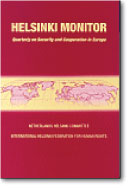Democratic Control of the OSCE

The Role of the Parliamentary Assembly
Autor(en): Beat Habegger
Journaltitel: Helsinki Monitor
Reviewed:
Band: 17
Ausgabe: 2
Seiten: 133-143
Verlag(e): Martinus Nijhoff Publishers
Publikationsjahr: 2006
